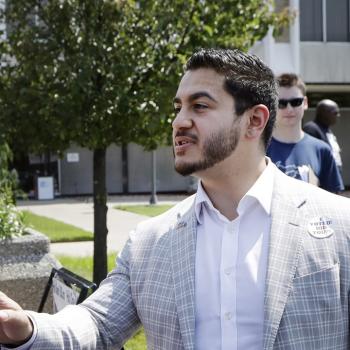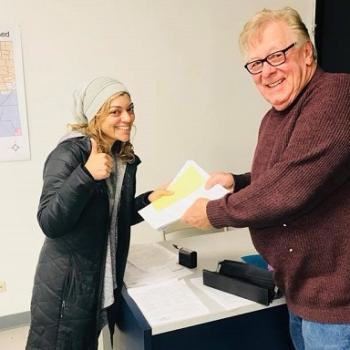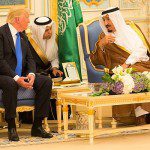 |
|
Not phoning it in
|
Chicago born comedian Azhar Usman is on a mission. Ever since joining with like-minded Muslim comedians to form the Allah Made Me Funny comedy troupe, he has watched his foray into a uniquely Western art form inspire Muslim comedians across the world. Similarly, the trio reached new audiences whose prejudices about Islam and Muslims were challenged with humor. Now, with the theatrical release of the widely anticipated concert film featuring the Allah Made Me Funny troupe, he is setting his sights on getting more Muslims involved with Hollywood, but on their own terms. Editor-in-chief Shahed Amanullah spoke with Usman about his next project (a dramatic short film entitled “The Boundary” that stars “Star Trek” alum Alexander Siddig), how Muslims can take advantage of the unique opportunities they have to produce quality media, and whether Hollywood may not be as anti-Muslim as you might have thought.
![]() When I met you 10 years ago, we were both dot-commers trying to get money for our companies; you were a laywer and an entrepreneur. Did you ever imagine that a decade later you would be making a living being a comedian and a filmmaker and impacting so many different people?
When I met you 10 years ago, we were both dot-commers trying to get money for our companies; you were a laywer and an entrepreneur. Did you ever imagine that a decade later you would be making a living being a comedian and a filmmaker and impacting so many different people?
Azhar Usman: The honest answer is no. I never imagined myself pursuing a full-time career in the arts, but at the same time, I found that the same kind of chutzpah it takes to be an entrepreneur is exactly what it takes to be in the entertainment business. It’s the same odds – only a small percentage are successful, and everybody things you’re going to fail. I have found that all the training I had as an entrepreneur – starting my own dot-com, raising capital, hiring employees, building a business from scratch – are the same tools I needed to make it in entertainment. It’s very much a survival business, so the idea is to keep yourself afloat and keep doing what you’re passionate about. It would be wonderful if [success] happened to any of us, to the Allah Made Me Funny tour, but at the same time that’s never been a goal for us. So long as we can do what we love to do and make a living at it, we’re more than thankful and grateful for the opportunity.
![]() You mentioned “Allah Made Me Funny” – this has been a path you’re taken for many years, going from small clubs to major tours to a new movie coming out on October 3rd. I saw the trailer on apple.com, which I suppose means you’ve made it. Is this the peak for “AMMF”? Has it run its route and culminated with this movie, or is there more life in it?
You mentioned “Allah Made Me Funny” – this has been a path you’re taken for many years, going from small clubs to major tours to a new movie coming out on October 3rd. I saw the trailer on apple.com, which I suppose means you’ve made it. Is this the peak for “AMMF”? Has it run its route and culminated with this movie, or is there more life in it?
I would say there’s more life in it. The first interview I did was for NPR in Detroit; the reviewer saw the film the previous night. He was not a Muslim, not an Arab, no connection to Islam in any meaningful way, but his first comment was that he turned to his wife and said “This is the Muslim version of the Kings of Comedy“. I told him that was a huge compliment. The idea when we began the project was to carve out a space in the universe of standup that could be a voice for people who have felt until now that their voices were not represented. We believe that AMMF has been able to do this in a relatively short amount of time, and we’re just delighted about it.
Some comedians in Australia who saw our show were inspired to start their own show, and they’ve gone on to win a bunch of awards, including at the prestigious Melbourne International Comedy Film Festival. Similarly, there is Somalian comedian Prince Abdi in the UK, Riad Moosa and Joey Rasdien in South Africa. We’ve been able to find these pockets of people, and we’ve love to bring all these people together under one tent and hold a show and release a follow-on product, perhaps “AMMF International”.
Muslims have supported this project from the beginning, and we always said that this is a community project, we’re not going to sell out to Hollywood. We’re going to keep this something we’ll do on our terms. At some point, inshallah, we can take this audience we’ve been buliding, primarily a Muslim audience, and then carry that over to a much larger crossover audience. [The movie] is a big step for, even though it is a modest theatrical release – it’s only 15 screens. But as far as Muslim entertainment is concerned, this has to be a first.
Here’s where I take tremendous inspiration – Moustapha Akkad, who made “The Message“, was a true pioneer. Before anyone saw his film, Muslims started to boycott the film.
![]() And there was that hostage situation in Washington, DC.
And there was that hostage situation in Washington, DC.
Exactly. Before even seeing the film, they made all sorts of assumptions about the depiction of the Prophet. He became so disgruntled by the Muslim reaction, who he thought would welcome the film as a grand success, that he stopped making films of that type and started pursuing typical Hollywood films. To me, that’s a huge tragedy.
Now what we’re trying to do is revive that effort. I’m very bullish on the future of Muslim media. There are so many talented young filmmakers coming out that the future is going to be one where we put out a lot of great indie films.
![]() Behind many of the little stories you tell on stage is a lot of pain. Does that get to you after a while, or is the fact that you take that pain and turn it into humor help you get though it all?
Behind many of the little stories you tell on stage is a lot of pain. Does that get to you after a while, or is the fact that you take that pain and turn it into humor help you get though it all?
I don’t think that there is always pain. It’s true that lot of the ideas are born out of sorrow or anguish. Jerry Seinfeld once remarked that standup is a journey into the self. That’s a very zen concept, and for me as a Muslim who loves the mystical tradition within Islam, that has great meaning for me. I do believe that the idea of getting to know God is intimately connected with getting to know yourself. That’s how Sheikh Nuh [Ha Mim Keller] describes Sufism – he says that everything that exists in Creation has an outward semblance and an inward reality. Tasawwuf is like that. I’s about deconstructing yourself so you can learn how to realize your full potential as a human being – that’s the outward semblance. The inward reality of that is concerned about the essence of God Himself.
Not to be too overly dramatic in making tafsir of Jerry Seinfeld, but the idea that you’re on stage and journeying into yourself, laying bare your soul and talking very honestly about things that keep you up at night, the things that bother and concern you, and sharing with the audience who is connecting it – you’re creating a shared consciousness. They’re relating to it, empathizing with it. So if your question is, “Is there a lot more going on behind the jokes than the jokes?”, then the answer is yes.
![]() You’re now branching out a little bit from comedy into filmmaking, and there is a trailer on the Net for your film called “The Boundary”. Can you tell us a little bit about that?
You’re now branching out a little bit from comedy into filmmaking, and there is a trailer on the Net for your film called “The Boundary”. Can you tell us a little bit about that?
At the moment, “The Boundary” is a short film, and our intent, inshallah, is to turn it into something larger – either a feature film or a TV series. It is a story about an Arab-American Muslim family that is returning from Canada back to the United States. They get stopped while driving across the border, and what ensues is a captivating family drama. It’s not a heavy-handed political film, although by nature it has political themes; rather it explores those themes through a very poetic family story.
The main driving force behind the film is a producer named Julius Onah, who is a friend of ours. My partner on this project is Matt Sumbuli, a friend whom I created a production company with called 9 Saints, named after the nine Sufi saints of Indonesia. It’s meant to create projects with themes that Muslims and other disenfranchised groups could find their own voices in. Julius himself is a Nigerian-born immigrant who isn’t Muslim, but is very familiar with Muslim culture and Islam, and is a phenomenally talented filmmaker. There’s another project I was involved with before called “Tinku’s World“, which is a sketch comedy that Julius had been involved with, so we had a good working relationship.
Julius came to us, knowing that we had started a production company, and pitched an early iteration of “The Boundary”. We, of course, loved it. Our belief has always been if we don’t tell our own stories in our own words, from our own perspective, then they won’t be told or other people will try to tell them. This has always been a problem – Hollywood whitewashing the stories of minority peoples. We took it on, raised the funds necessary to produce the short film, made it with the highest quality 35mm film and Dolby digital sound. The actors are all Hollywood actors – the lead is Alexander Siddig, who many people recognize from Syriana and 24 and Star Trek. Opposite him is Christopher Mann, who has been a regular on “The Wire” on HBO. The wife is played by Jacqueline Antamarian, who is also a former “Sopranos” actress.
It’s making the rounds on the festival circuit, and was selected as a finalist by the HBO Short Film Competition, which is pretty exciting because HBO is interested in licensing it to be shown in February. The response has been really positive, not only from viewers but by people in the industry. We’re hoping, inshallah, that it can open up doors to a larger feature project or a TV series that explores the same themes.
![]() Clearly, this film has brought you into the heart of Hollywood. A lot of Muslims looking in from the outside have this perception of Hollywood being a hostile environment to Muslims, both in terms of how they treat Muslim themes as well as how they treat Muslims who want to get into the business. What would you tell them?
Clearly, this film has brought you into the heart of Hollywood. A lot of Muslims looking in from the outside have this perception of Hollywood being a hostile environment to Muslims, both in terms of how they treat Muslim themes as well as how they treat Muslims who want to get into the business. What would you tell them?
I would tell them to stop believing the Hollywood hype – those are phony perceptions. It’s cliché for people in the business, but they call it show business for a reason – half of it is show, and half of it is business. Ultimately, this is about commerce. Maybe a few are in it for the art, but most are in it for the business and want to make money. So if you can come to them with stories that are captivating and compelling and can become marketable projects, they will get behind it. Of course there will always be a few people who are racist, but they comprise a very small percentage. And even among those are some who might hate Muslims, but if they see an opportunity will take it, because they love money more than they hate Muslims.
We have to understand that we live in a capitalistic system, for better or worse, and Hollywood is in many ways a Darwinian place where the best content rises to the top. If you can build marketable projects and interesting and compelling characters, your stuff will get made. And if you have the entrepreneurial skills to go out and raise your own capital, you can begin to tap into sources that are non-traditional. There was an article in the NY Times about Abu Dhabi investors who invested $1 billion into a major Hollywood studio. On paper they say there are no strings attached, but naturally if you invest that kind of money you can have some say in the kind of content that gets greenlit.
This is why I’m so bullish – I know there are more and more creative types coming up the ranks, as well as non-traditional funding sources that we can go to – whether it is Gulf, Malaysia, Turkey, and so on – where people want to make Hollywood-quality content, but don’t know how to go about doing it. It’s a great time to be getting into the business. There are very few people who have the cultural understanding and experience having grown up hybrid culturally, and to be able to tell those stories coming from that unique perspective, that’s something money can’t buy. I’m really juiced about it.
Hollywood keeps putting out crap like Traitor and Towelhead and other BS, and it’s just frustrating for guys like us. Those are the stories what we need to be telling, but we need to be telling them authentically. Unfortunately, the demand for this kind of content is outstripping the supply of people who can authentically do it. So we welcome the entry of more and more young [Muslim] filmmakers – I’m really looking forward to collaborating with new talent.
(Photo: Azizul Hadi via flickr under a Creative Commons license. “Allah Made Me Funny” opens in 15 select theatres across the US today)
Shahed Amanullah is editor-in-chief of altmuslim.com













